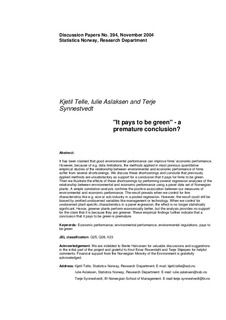| dc.contributor.author | Telle, Kjetil | |
| dc.contributor.author | Aslaksen, Iulie | |
| dc.contributor.author | Synnestvedt, Terje | |
| dc.date.accessioned | 2011-11-23T12:11:13Z | |
| dc.date.available | 2011-11-23T12:11:13Z | |
| dc.date.issued | 2004 | |
| dc.identifier.issn | 1892-753x | |
| dc.identifier.uri | http://hdl.handle.net/11250/180475 | |
| dc.description.abstract | It has been claimed that good environmental performance can improve firms’ economic performance.
However, because of e.g. data limitations, the methods applied in most previous quantitative
empirical studies of the relationship between environmental and economic performance of firms
suffer from several shortcomings. We discuss these shortcomings and conclude that previously
applied methods are unsatisfactory as support for a conclusion that it pays for firms to be green.
Then we illustrate the effects of these shortcomings by performing several regression analyses of the
relationship between environmental and economic performance using a panel data set of Norwegian
plants. A simple correlation analysis confirms the positive association between our measures of
environmental and economic performance. The result prevails when we control for firm
characteristics like e.g. size or sub-industry in a pooled regression. However, the result could still be
biased by omitted unobserved variables like management or technology. When we control for
unobserved plant specific characteristics in a panel regression, the effect is no longer statistically
significant. Hence, greener plants perform economically better, but the analysis provides no support
for the claim that it is because they are greener. These empirical findings further indicate that a
conclusion that it pays to be green is premature.
Keywords: Economic performance; environmental performance; environmental regulations, pays to
be green | no_NO |
| dc.language.iso | eng | no_NO |
| dc.publisher | Statistics Norway, Research Department | no_NO |
| dc.relation.ispartofseries | Discussion Papers;No. 394 | |
| dc.subject | Environmental regulations | no_NO |
| dc.subject | Environmental performance | no_NO |
| dc.subject | JEL classification: Q25 | no_NO |
| dc.subject | JEL classification: Q28 | no_NO |
| dc.subject | JEL classification: K23 | no_NO |
| dc.title | It pays to be green - a premature conclusion? | no_NO |
| dc.type | Working paper | no_NO |
| dc.subject.nsi | VDP::Social science: 200::Economics: 210::Economics: 212 | no_NO |
| dc.source.pagenumber | 25 s. | no_NO |
